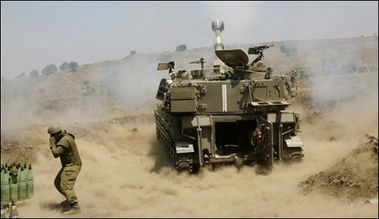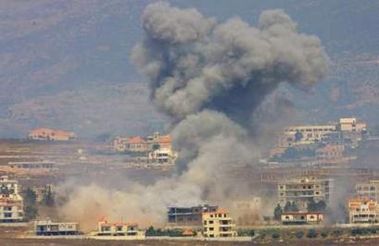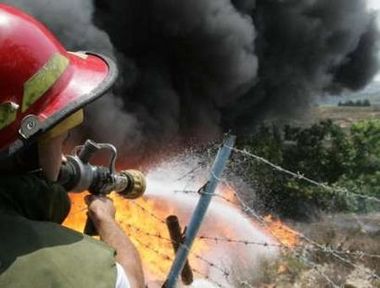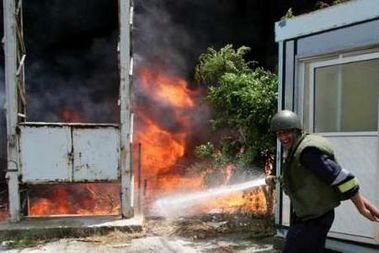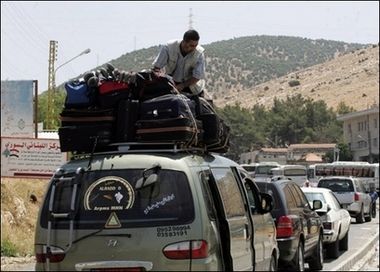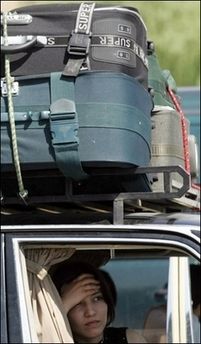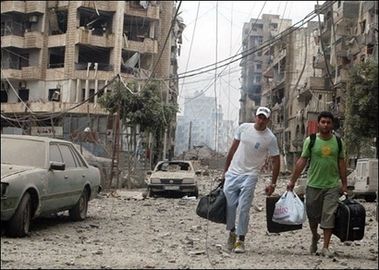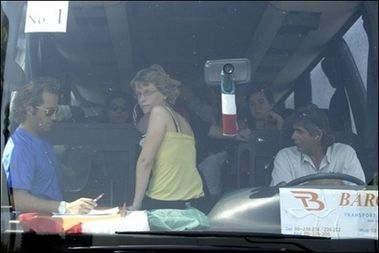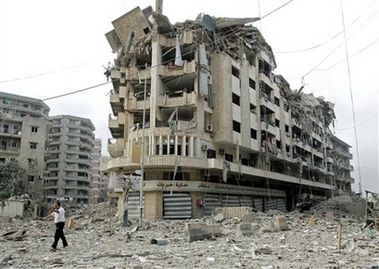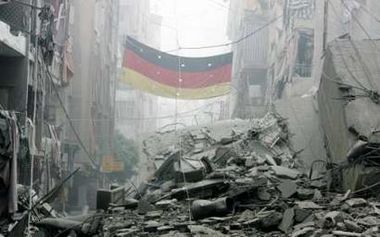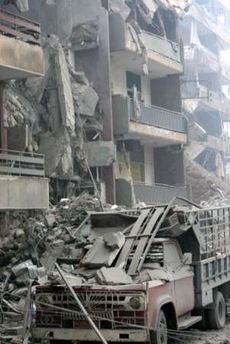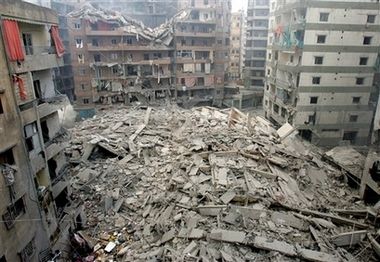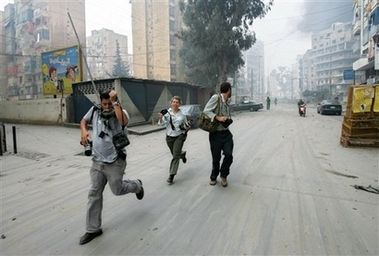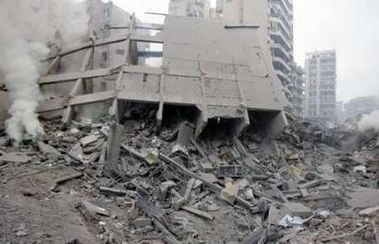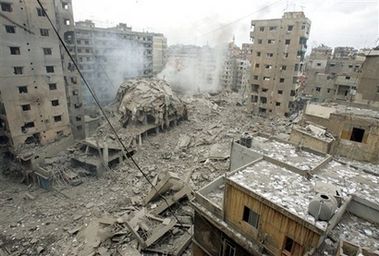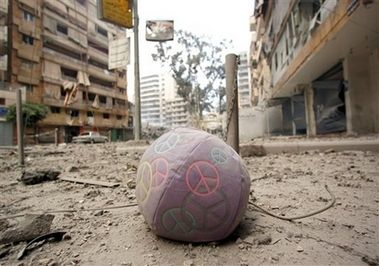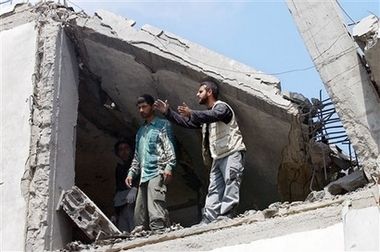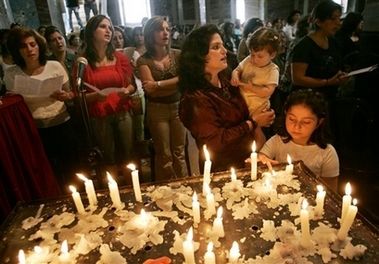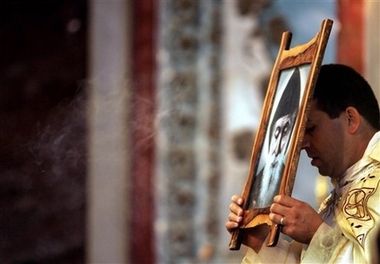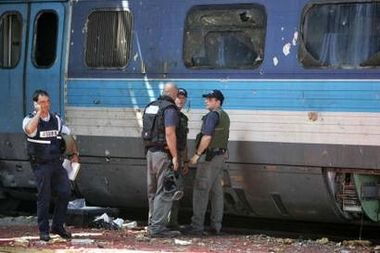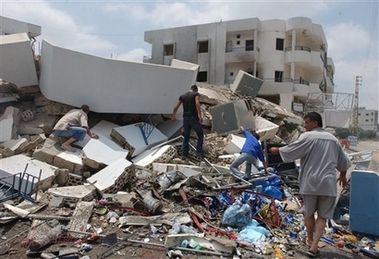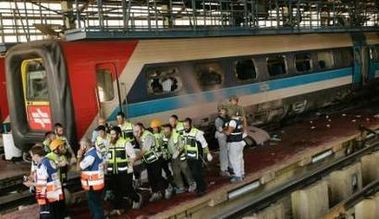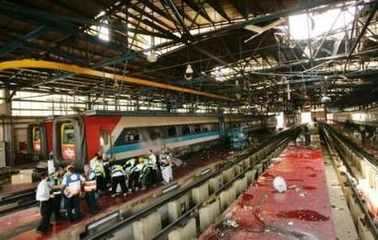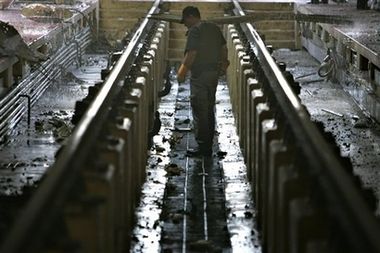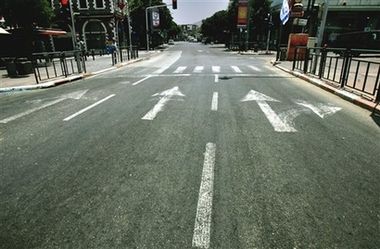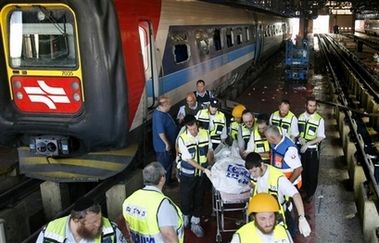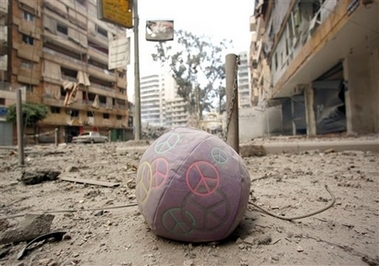 Day 5, Beirut/Tel Aviv – Israel’s offensive against Lebanon and the Hezbollah guerrilla group threatened to escalate dramatically Sunday when a missile barrage slammed into the port city of Haifa and the Israeli military ordered all Lebanese civilians to leave southern Lebanon. Over 100 Lebanese have been killed, and around 280 wounded, in the approximately 220 attacks, most aerial, that Israel has launched since the offensive began on Wednesday.
Day 5, Beirut/Tel Aviv – Israel’s offensive against Lebanon and the Hezbollah guerrilla group threatened to escalate dramatically Sunday when a missile barrage slammed into the port city of Haifa and the Israeli military ordered all Lebanese civilians to leave southern Lebanon. Over 100 Lebanese have been killed, and around 280 wounded, in the approximately 220 attacks, most aerial, that Israel has launched since the offensive began on Wednesday.
Some 12 Israeli civilians have also been killed and between 325 to 340 people wounded by the more than 450 rockets Hezbollah has fired at the Jewish state. Fur Israeli sailors were also killed when an Iranian-produced c-802 missile fired from the Lebanese coast hit a missile boat off the coast of Lebanon Friday night.
Hezbollah’s deadliest rocket barrage so far took place Sunday morning, when around ten missiles slammed into Haifa, Israel’s third largest city. Eight people were killed, and dozens wounded, in the strike, which Hezbollah said was carried out by Raad 2 and Raad 3 missiles. Pls click READ MORE to view more pictures, and click on news archive to view pictures of day1 and day2.
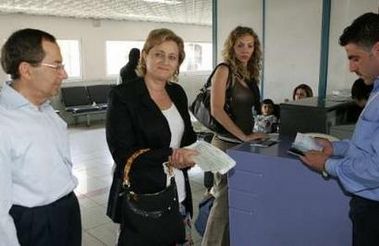
American passengers who escaped from Lebanon go through immigration at Damascus airport June 16, 2006. Syria vowed on Sunday a ‘harsh and direct’ response if it is attacked by Israel . REUTERS/Khaled Al-Hariri (SYRIA)
An Israeli soldier blocks his ears as a mobile artillery unit fires155mm shells towards Hezbollah targets in southern Lebanon, at a military staging area along the northern Israeli border with Lebanon. Prime Minister Tony Blair has said there was an "arc of extremism" across the Middle East and the world would rue the consequences of failing to resolve the burning issues there.(AFP/Menahem Kahana)
Smoke rises from Khiam village that was targeted by Israeli air strikes, in south Lebanon, July 16,2006. Israeli air raids shook Beirut on Sunday, the fifth day of a devastating assault on Hizbollah and Lebanon that has prompted no U.N. Security Council action and only a mild plea for restraint from Israel ‘s U.S. ally. REUTERS/Karmallah Daher (LEBANON)
A firefighter extinguishes a fire at a plastic factory in Tyre, south Lebanon, July 16, 2006, after it was hit by Israeli airstrikes. Israeli air raids shook Beirut on Sunday, the fifth day of a devastating assault on Hizbollah and Lebanon that has prompted no U.N. Security Council action and only a mild plea for restraint from Israel ‘s U.S. ally. REUTERS/Haidar Hawila. (LEBANON)
A firefighter extinguishes a fire at a plastic factory in Tyre, south Lebanon July 16, 2006, after it was hit by Israeli airstrikes. Israeli air raids shook Beirut on Sunday, the fifth day of a devastating assault on Hizbollah and Lebanon that has prompted no U.N. Security Council action and only a mild plea for restraint from Israel’s U.S. ally. REUTERS/Haidar Hawila. (LEBANON)
Cars carrying fleeing people line up to cross the Lebanese-Syrian border at Masnaa. Cyprus has said it was expecting to receive a flood of evacuees in the coming days as the mass exodus of Europeans and other nationals stranded in war-ravaged Lebanon swung into action.(AFP/Joseph Barrak)
A Lebanese woman waits in a car to cross the Lebanese-Syrian border at Masnaa. Cyprus has said it was expecting to receive a flood of evacuees in the coming days as the mass exodus of Europeans and other nationals stranded in war-ravaged Lebanon swung into action.(AFP/Joseph Barrak)
Lebanese men flee the Beir al-Abed area in the southern Lebanese suburb of Dahyieh Junubiya, following Israeli air raids. Eight people were killed in a Hezbollah rocket attack on Israel ‘s third largest city as Israel continued to pound Lebanon on the fifth day of a spiralling conflict that has already cost scores of lives but spurred little international action.(AFP/Anwar Amro)
European nationals on a bus in the northern city of Tripoli wait to be evacuated from Lebanon to neighbouring Syria with the help of the Italian embassy, July 15. The Foreign and Commonwealth Office has said the government was preparing for a possible evacuation of its nationals from Lebanon, who should be ready to leave at short notice.(AFP/Ossama Ayoub)
A man walks past a damaged apartment building near the Hezbollah headquarters in the suburbs of Beirut, Lebanon, after Israeli air strikes early Sunday morning, July 16, 2006. Israeli war planes bombed a major power station south of Beirut on Sunday as Lebanon reeled under five days of air and sea strikes that have killed more than 100 people, mostly civilians, and damaged much of its infrastructure.(AP Photo/Issam Kobeisi)
Buildings are demolished in southern Beirut after the Hizbollah stronghold was targeted by Israeli air strikes July 16, 2006. Many fans of Germany’s soccer team live in the area and the German national flag was placed along the street during the recent World Cup. Israeli air raids shook Beirut on Sunday, the fifth day of a devastating assault on Hizbollah and Lebanon that has prompted no U.N. Security Council action and only a mild plea for restraint from Israel ‘s U.S. ally. REUTER/Issam Kobeisi (LEBANON)
Cars and Buildings are demolished in southern Beirut after the Hizbollah stronghold was targeted by Israeli air strikes July 16, 2006. Israeli air raids shook Beirut on Sunday, the fifth day of a devastating assault on Hizbollah and Lebanon that has prompted no U.N. Security Council action and only a mild plea for restraint from Israel ‘s U.S. ally. REUTERS/Adnan Hajj (LEBANON)
A flattened square of rubble is what remains of the Hezbollah headquarters in the suburbs of Beirut, Lebanon, after Israeli air strikes early Sunday morning, July 16, 2006. Israeli war planes bombed a major power station south of Beirut on Sunday as Lebanon reeled under five days of air and sea strikes that have killed more than 100 people, mostly civilians,
Foreign photographers flee after hearing the sound of approaching Israeli warplanes while taking photographs of the destruction in the suburbs of Beirut, Lebanon, Sunday, July 16, 2006, following heavy Israeli airstrikes. Israeli airstrikes reduced entire apartment buildings to rubble and knocked out electricity in swaths of the Lebanese capital Sunday, and Israel dramatically escalated the ferocity of its campaign after Hezbollah rockets hit the northern city of Haifa. (AP Photo/Hussein Malla)
Hizbollah’s political headquarters are demolished in southern Beirut after the Hizbollah stronghold was targeted by Israeli air strikes July 16,2006. Israeli air raids shook Beirut on Sunday, the fifth day of a devastating assault on Hizbollah and Lebanon that has prompted no U.N. Security Council action and only a mild plea for restraint from Israel ‘s U.S. ally. REUTER/Issam Kobeisi (LEBANON)
The house of Hezbollah leader Sheik Hassan Nasrallah is reduced to rubble, center, in between destroyed apartment buildings in the suburbs of Beirut, Lebanon, following Israeli air strikes early Sunday morning, July 16, 2006. Israeli war planes bombed a major power station south of Beirut on Sunday as Lebanon reeled under five days of air and sea strikes that have killed more than 100 people, mostly civilians, and damaged much of its infrastructure.(AP Photo/Issam Kobeisi)
A ball marked with peace signs lies amid debris in a street near the demolished headquarters of Hezbollah, in the suburbs of Beirut, Lebanon, following Israeli air strikes early Sunday morning, July 16, 2006. Israeli war planes bombed a major power station south of Beirut on Sunday as Lebanon reeled under five days of air and sea strikes that have killed more than 100 people, mostly civilians, and damaged much of its infrastructure.(AP Photo/Kevork Djansezian)
A Lebanese citizen looking for survivors, shouts out for help after finding human remains in a destroyed building that was targeted by Israeli airstrikes in the southern village of Zebdine, near the market town of Nabatiyeh, Lebanon, Sunday, July 16, 2006. Israeli airstrikes reduced entire apartment buildings to rubble and knocked out electricity in swaths of the Lebanese capital Sunday, and Israel dramatically escalated the ferocity of its campaign after Hezbollah rockets hit the northern city of Haifa. (AP Photo/Mohammed Zaatari)
Lebanese Maronite Christians participate in the Sunday Mass, in St. George’s church of the southern Lebanese village of Qoleia, close to the border with Israel, Sunday July 16, 2006. Israeli airstrikes reduced entire apartment buildings to rubble and knocked out electricity in swaths of the Lebanese capital Beirut Sunday, and Israel dramatically escalated the ferocity of its campaign after Hezbollah rockets hit the northern Israeli port city of Haifa. (AP Photo/Lefteris Pitarakis)
Father Fadi Setami, a Lebanese Maronite Christian priest, holds a picture of Saint Charbel as he leads the Sunday Mass in St. George’s church in the southern Lebanese village of Qoleia, close to the border with Israel , Sunday July 16, 2006. Israeli airstrikes reduced entire apartment buildings to rubble and knocked out electricity in swaths of the Lebanese capital Beirut Sunday, and Israel dramatically escalated the ferocity of its campaign after Hezbollah rockets hit the northern Israeli port city of Haifa. (AP Photo/Lefteris Pitarakis
Israeli police officers survey the scene following a rocket attack on Haifa July 16, 2006. Israel said it planned to raise the alert level in the commercial capital Tel Aviv on Sunday following a barrage of Hizbollah rocket fire on Haifa that killed eight people and wounded a dozen. REUTERS/Ammar Awad
People search in the rubble of a house for survivors after an Israeli warplane missile struck the southern Lebanese village of Zebdine, near the market town of Nabatiyeh, Sunday July 16, 2006. Israeli airstrikes reduced entire apartment buildings to rubble and knocked out electricity in swaths of the Lebanese capital Beirut Sunday, and Israel dramatically escalated the ferocity of its campaign after Hezbollah rockets hit the northern Israeli portcity of Haifa. (AP Photo/Mohammed Zaatari)
Israeli rescue workers evacuate a victim from the scene of a rocket attack in Haifa July 16, 2006. Israel raised the alert level in the commercial capital Tel Aviv on Sunday following a barrage of rocket fire by Lebanese group Hizbollah on Haifa that killed eight people and wounded 20. ISRAEL OUT REUTERS/Barkay Wolfson (ISRAEL)
Israeli rescue workers cover a victim’s body at the scene of a rocket attack in Haifa July 16, 2006. Israel raised the alert level in the commercial capital Tel Aviv on Sunday following a barrage of rocket fire by Lebanese group Hizbollah on Haifa that killed eight people and wounded 20. ISRAEL OUT REUTERS/Barkay Wolfson (ISRAEL)
A policeman inspects the site of a rocket attack by Hezbollah guerrillas at the train station in the northern Israeli city of Haifa, Sunday July 16, 2006. Lebanese guerrillas fired a relentless barrage of rockets into Haifa on Sunday, killing eight people at a train station and wounding seven others, police said. Israeli Prime Minister Ehud Olmert vowed that there would be ‘far-reaching consequences’ for the attack.(AP Photo/Oded Balilty)
A deserted street in the center of the northern Israel town of Tiberias, by the Sea of Galilee, Sunday July 16, 2006. Lebanese guerrillas fired a relentless barrage of rockets into Haifa on Sunday, killing eight people at a train station and wounding seven others, police said. Israeli Prime Minister Ehud Olmert vowed that there would be ‘far-reaching consequences’ for the attack. (AP Photo/Muhammed Muheisen)
Police and Zaka religious rescue workers wheel a dead Israeli from the site of a rocket attack by Hezbollah guerrillas at the train station in the northern Israeli city of Haifa, Sunday July 16, 2006. Lebanese guerrillas fired a relentless barrage of rockets into Haifa on Sunday, killing eight people at a train station and wounding seven others, police said. Israeli Prime Minister Ehud Olmert vowed that there would be ‘far-reaching consequences’ for the attack.(AP Photo/Oded Balilty)
Police and Zaka religious rescue workers wheel a dead Israeli from the site of a rocket attack by Hezbollah guerrillas at the train station in the northern Israeli city of Haifa, Sunday July 16, 2006. Lebanese guerrillas fired a relentless barrage of rockets into Haifa on Sunday, killing eight people at a train station and wounding seven others, police said. Israeli Prime Minister Ehud Olmert vowed that there would be ‘far-reaching consequences’ for the attack. In the background the hole left on the roof by the incoming rocket.(AP Photo/Oded Balilty)
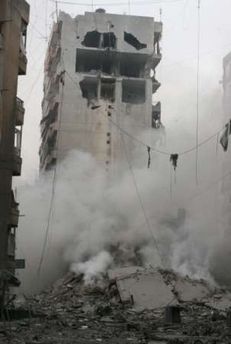
Lebanese suburbs pictures
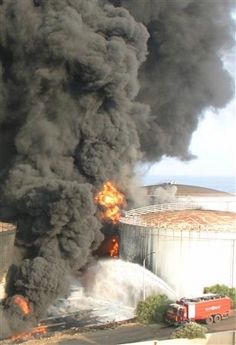
Lebanon jiyeh city plant burning
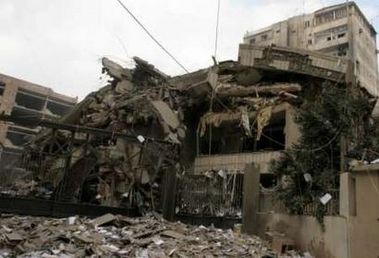
Houses completely destroyed in Lebanon after the Israeli strike
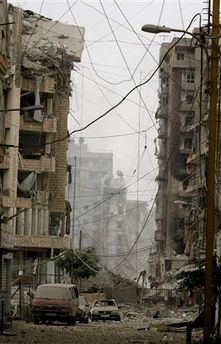
Buildings completely destroyed in beirut
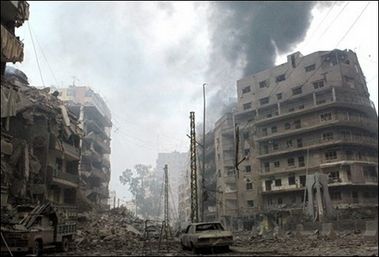
Dahiyeh in ruins
Rockets also landed in nearby Acre, and in the resort city of Nahariya, which lies close to the Lebanese border and has been a frequent target of Hezbollah rockets over the years. Further barrages also fell on Haifa later in the day.
Following the first missile barrage, the Israeli army ordered residents of Tel Aviv and those further north to be on the alert for possible attacks.
Israeli intelligence estimates that Hezbollah has missiles capable of hitting Tel Aviv, Israel’s largest metropolis which is located over 100 kilometres from the Lebanon border.
Since Wednesday, Hezbollah has begun firing rockets into Israel which have a longer range – and more destructive power – than the Katyushas the organization had previously employed against Israel.
Hezbollah threatened more attacks if Israel continued with the offensive, which was launched after a Hezbollah cross-border raid Wednesday saw two Israeli soldiers abducted and eight killed.
‘We will not spare any place inside Israel if the Israeli aggression continues on our people,’ Hezbollah sources told Deutsche Presse-Agentur dpa.
Shortly after the missile attack on Haifa, Israel warned residents of south Lebanon to vacate their homes, reports from Lebanon said. The Israeli army would not confirm that it had issued any warning.
Lebanese security sources told dpa that Israel was preparing a fierce attack against areas at the southern border with Israel.
Thousands of people crammed into trucks and minibuses and began to leave their homes. ‘Shells are starting to fall on the area,’ an eyewitness in Kfar Killa told dpa.
Israel had earlier Sunday pounded Beirut’s southern suburbs early Sunday and Hezbollah claimed to have repelled the first attempted Israeli army incursion into southern Lebanon since the hostilities began.
‘A Zionist enemy force tried around midnight Saturday to make its way towards the western sector of Lebanon, but the Mujahadeen of the Islamic Resistance repelled them,’ the group said in a statement distributed in Beirut.
Unconfirmed Israeli media reports Sunday said small numbers of elite Israeli ground forces have entered Lebanon for what was described as limited operations.
Israel’s overnight attacks concentrated on Beirut’s southern suburbs where some 300 shells fell on the southern suburbs, causing massive destruction to the area.
Hezbollah’s al-Manar television described the attack as the most intensive bombing since the Israeli offensive began Wednesday.
An Israeli army spokeswoman said Sunday morning that Israel had carried out more than 50 attacks overnight.
She said the Israel Air Force attacked 10 radar stations along the Lebanon coast, the al-Manar television station and Hezbollah headquarters.
Lebanese sources said Israeli aircraft also carried out intensive bombing raids early Sunday in Beirut’s southern suburbs and the seaside Ouzai area which is also close to Beirut International airport.
In a televised address to the nation, Lebanese Prime Minister Fuad Siniora called on Saturday for an immediate ceasefire and the end to the ‘collective punishment’ of his country.
Israel unleashed its onslaught after Hezbollah captured two soldiers Wednesday, and killed eight others, in a cross-border raid which opened up a new battleground following a similar deadly offensive against Gaza over the capture of another soldier by Palestinian militants three weeks ago.
Israel has said its aim is to ‘break’ Hezbollah, and that its demand that the organization not return to positions it previously controlled along the border is ‘non-negotiable.’
© 2006 dpa – Deutsche Presse-Agentur
